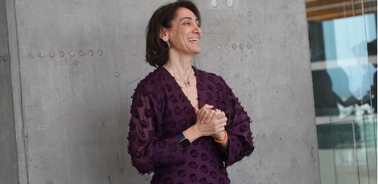Rafif Srour Daher: the Outstanding Profile of Vice Dean of the Sci-Tech School

The story of Rafif Srour Daher from environmental sciences to data scientist.
In March, much of the western world heralds the advances of women for Women’s Month. IE University dedicated several events celebrating women, including: IE Women in Business Forum, Women Fundraising Gala and Breaking Stereotypes in STEM Education. The latter event– organized by the School of Science and Technology– was particularly significant for Vice Dean, Rafif Srour Daher. Not only did she orchestrate the event, but is a walking example of a woman in the sciences who breaks stereotypes daily: an American-educated, Lebanese scientist who is the first female dean of the Sci-Tech School.
Under her guidance, the school has developed new bachelor programs in Applied Mathematics and Environmental Sustainability and inaugurated the Robotics and AI lab. She is a strong advocate for students and has won the respect of her colleagues. Beyond her contribution to the advancement of the institution, however, Srour’s personal journey demonstrates a unique path for a strong woman from environmental to data science.
Srour comes from a Lebanese family primarily centered on studies in business and political science– her grandfather was a poet. But, she was free to choose her own path and not forced to follow her parents’ steps. Spending summers in her grandparents’ farm harvesting apples, cherries and apricots may have swayed her interest. When it was time to choose her undergraduate direction, she chose a bachelor of agricultural sciences and engineering in the American University of Beirut.
“It [the bachelor] gave me the option to work with nature which is something I personally love,” remembered Srour.
Srour then undertook a master’s of soil sciences, since the topic of industrial waste disposal was emerging as a huge environmental issue. She wanted to understand what implications the problem had “on contaminants migration into the biosphere and their entry into the food chain and all the consequent impact on people.” She even dedicated her PhD to the quantitative perspective of the micro interactions of contaminants with soil particles. The more Srour was digging into the topic, the more she had to deal with statistics and modeling. With time, she found herself studying and taking courses on data science– and loved it. As the years passed, her interests in math, stats and data science grew and she found herself studying and taking online courses.
Srour said her career and scientific success is thanks to her stubbornness– in addition to the hard work.
“I am not a person who takes no for an answer particularly when it comes to my doing something I am passionate about,” she said.
Moreover, Srour highlights the support she always had throughout her path, especially from men.
“I always had full support throughout my career from many people, my father, advisors, professors and strangely all of them men,” said Srour.
The Sci-Tech Vice Dean said she never doubted her abilities and talents and never thought things would be easier if she were male. If anything, she said any challenges made her stronger. Even so, she is concerned about issues related to women in the STEM industry: low gender representation, stereotypes in STEM education and prejudices in the workplace.
For her, the key is to design curricula that are more inclusive and make it accessible to women and men alike. She said that the idea that fields such as math and science are more suitable for men than women is ingrained in our culture so academic institutions and educators should take that into account when designing our programs.
“The academic world is very demanding. Doing scientific research and investigations are time consuming,” she said. “We need to start being flexible and offer women who decide to do other things in life such as making a family the flexibility of combining both worlds.”
Now, as the Vice Dean of IE School of Science and Technology undergraduate programs, Srour has once again shifted her interest to the impact of technology on higher education. She is trying to find an answer to the question, “How can we use the full potential of AI to improve our teaching and provide better experience to our students, both academically and personally?” Srour now considers the implementation of AI in the curricula a challenge that she, as one of the school’s leads, needs to address.
But true to her vision of the need to combine the academic researcher in her with her personal life– which includes two children– Srour chisels out time to balance those two worlds. Although she jokes that she barely remembers what “free time” means, Srour makes room to spend time with her family, as well dedicate herself to hobbies like fitness, painting, reading, and listening to music.
“Whenever I can, I am a fitness freak, so I try not to skip my workouts,” she said.